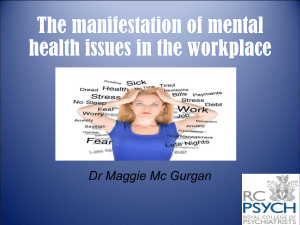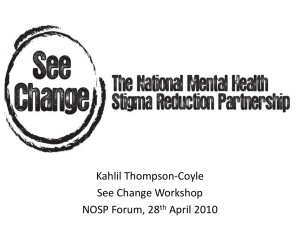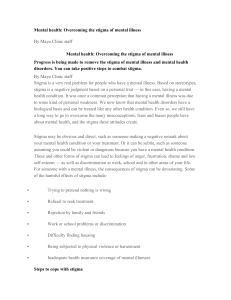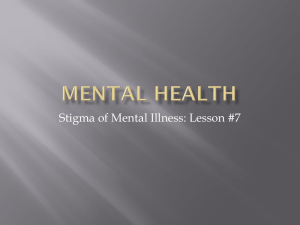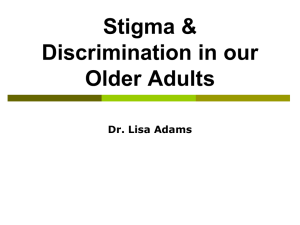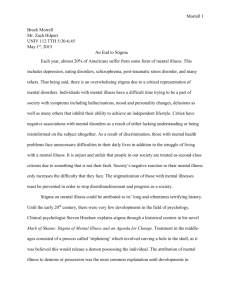stigma and discrimination against people with mental illness among
advertisement
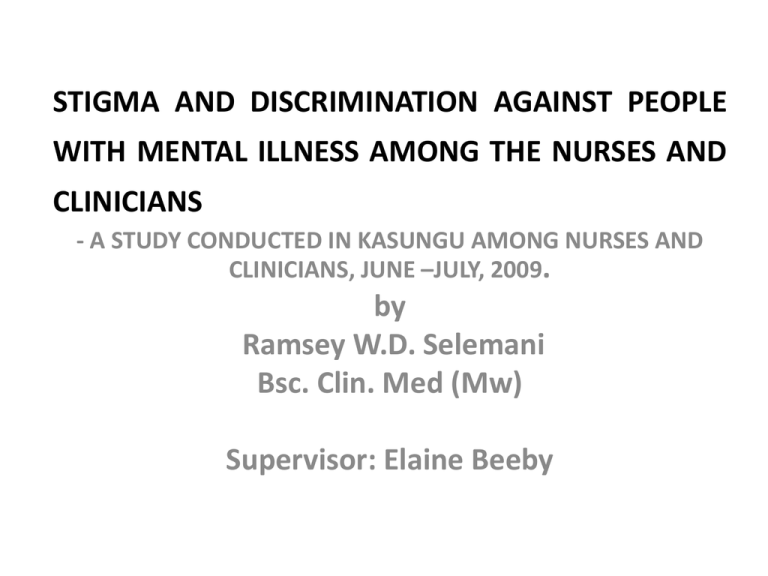
STIGMA AND DISCRIMINATION AGAINST PEOPLE WITH MENTAL ILLNESS AMONG THE NURSES AND CLINICIANS - A STUDY CONDUCTED IN KASUNGU AMONG NURSES AND CLINICIANS, JUNE –JULY, 2009. by Ramsey W.D. Selemani Bsc. Clin. Med (Mw) Supervisor: Elaine Beeby INTRODUCTION • Stigma and discrimination against people with mental illness is common among all spheres. • Throughout history, the label of mental illness has marked persons, and differentiated them from those without a mental illness. • Stereotyping and prejudice, in turn, may results in barriers to access to knowledgeable health care, treatment, social resources, social inclusion and opportunities for recovery. INTRODUCTION-cont. • Despite having knowledge of the negative effects of stigma and discrimination against people with mental illness, health care workers are on record stigmatising and discriminating. AIMS • The aim of the study was to determine factors that influence stigma and discrimination against people with mental illness among general nurses and clinicians, and to examine its level. METHOD • This study utilised qualitative research design which was exploratory and descriptive in nature. • The study was conducted using phenomenological technique. • Purposive sampling method was used to select participants. • General nurses and clinicians were sampled. • In-depth interviews and focus group discussions were used in collecting data • Data was analysed concurrently using contents data analysis. RESULTS • The findings of the study revealed that, there is significant stigma and discrimination against people with mental illness among nurses and clinicians. • It has been shown that most health care workers avoid clients with mental disorders because they are afraid of violent and aggressive behaviours among others. RESULTS-cont. • Others attributed loss of interest in mental health to one or more of the following reasons; lack of motivation, lack of knowledge and skills, shortage of resources and supplies, non curability, and having views that mental health is a speciality. Above all, health professionals do not receive adequate mental health training during their basic training. CONCLUSION • This study has revealed significant stigma and discrimination against people with mental illness among nurses and clinicians. • Stigma and discrimination retard the affected people from seeking proper assistance. • Negative attitudes towards mental disorders by health professionals have serious negative effects on their clients and the general public. CONCLUSION-cont. • Review of health training curriculum is required in order to include adequate information which will equip health workers and minimise stigma and discrimination against people with mental disorder among nurses and clinicians REFERENCES 1. Adewuya, A.O., & Oguntade, A.A. (2007). Doctors‟ attitude towards people with mental illness in Western Nigeria. Soc Psychiatry Psychiatr Epidemiol. Vol. 42:931– 936. 2. Angermeyer, M. C. & Matschinger H. (2003). The stigma of mental illness: effects of labelling on public attitudes towards people with mental disorder. Acta Psychiatr Scand (108): 304–309. 3. Babbie, E. & Mouton, T (2001). Practice of Social Research. South African edition. Oxford. 4. Baldwin, M. L. & Marcus, S.C. (2006) Perceived and Measured Stigma Among Workers With Serious Mental Illness. Psychiatric Services. Vol. 57 (3): 388-391. 5. Bless C., Higson-Smith C. & Kagee A. (2006). Fundamentals of Social Research Methods- An African Perspective (4th Edition). Cape Town: REFERENCES 6. Juta & Co Ltd. Burns, N. & Grove S.K. (2003) Understanding nursing Research (3rd Edition). London: Saunders. 7. Burns, N. & Grove S.K. (2005). Practice of Nursing Research (5th edition). Philadelphia: Elsevier. 8. Brink, H. (2006). Fundamentals of Research Methodology for Health Care Professionals (2nd edition) Cape Town: Juta & company limited. 9. Clifford, C.L. & Clark, J. (2004). Getting Research into Practice. Edinburgh: Churchill Livingstone. 10. Chow, L.Y., Kam, W.K. & Leung, C.M. (2007). Attitudes of healthcare professionals towards psychiatric patients in a general hospital in Hong Kong. Hong Kong Journal of psychiatry. Vol. 17 (1): 3-9.

